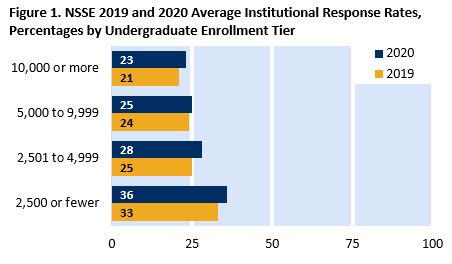
The average response rate for U.S. NSSE 2020 institutions was 30%, up two percentage points from last year. The highest response rate among U.S. institutions was 79%, and about three in five achieved a response rate of 25% or higher. Higher average response rates were observed across all undergraduate enrollment tiers relative to last year’s administration (Figure 1). Fifty-nine percent of institutions chose to offer a survey incentive to increase response rates. On average, these institutions had a 33% institutional response rate, seven percentage points higher than those that did not offer an incentive.

Go to an accessible version of Figure 1.
Approximately 1.8 million first-year and senior students from 601 institutions (531 in the US, 65 in Canada, and 5 in other countries) were invited to participate in 2020, yielding 484,242 respondents. Participating institutions and students reflected the diversity of bachelor’s-granting colleges and universities in the US with respect to institution type, public or private control, size, region, and locale. Canadian respondents included 134,288 students (59% first-year, 41% senior) from 63 institutions from ten provinces, including 24 institutions in Ontario; 12 in Quebec; and under 10 from each of the remaining eight provinces. A searchable list of participating institutions is on the NSSE website.
COVID-19 Had Little Impact on NSSE 2020 Results
Of course, the coronavirus pandemic has had a profound impact on almost all colleges and universities across North America. Despite the tumult it caused, the vast majority of schools’ participating in NSSE 2020 successfully collected data to improve undergraduate education. An in-depth analysis of NSSE data revealed survey response behavior and results to be relatively unaffected. Ultimately, 19 institutions withdrew from NSSE and 4 opted to exclude post-disruption survey respondents from their reports. Visit our website to learn more about how the NSSE 2020 administration unfolded, actions taken by NSSE to minimize the pandemic’s impact, and the various analyses completed to ensure data quality.
Full details of the 2020 administration can be found in the NSSE 2020 Overview.

